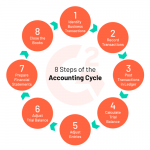Keep in mind that the rules differ depending on the country in which you operate, so it’s a good idea to check with an accountant or tax advisor to find out which tax-deductible expenses apply to your business. Keeping track of fixed and variable expenses can be how to compile and use income statement helpful in determining the breakeven point for product pricing. More important, it’s a budgeting tool to minimize fixed costs when times get tough. Every company faces unavoidable expenses, meaning costs that are necessary to maintain normal business operation.
Business owners are not allowed to claim their personal, non-business expenses as business deductions. Non-operating expenses are separate from operating expenses from an accounting perspective so as to be able to determine how much a company earns from its core activities. When constructing an expense report, the primary goal is to identify the expense(s) to be included. This can be based on the payee, spending category (type of spending), or on a particular project or client the expense was related to. Key components of an expense report include the date expenses were paid, who the money went to, how much was specifically spent and the type of expense it was.
How to use expense in a sentence
Also known as the management expense ratio (MER), the Expense Ratio shows us what portion of a fund goes into administrative expenses. It’s calculated by dividing the fund’s operating expenses by the value of its assets. There are other types of business expenses of course, including employee travel, food costs, reimbursement, etc. While expense tracking might seem tedious, it’s a necessary part of managing the financial side of your business.
Non-operating expenses are the opposite of operating expenses — costs that are not directly related to a business’s core function. Under cash basis accounting, an expense is usually recorded only when a cash payment has been made to a supplier or an employee. Under the accrual basis of accounting, an expense is recorded as noted above, when there is a reduction in the value of an asset, irrespective of any related cash outflow. Common expenses include payments to suppliers, employee wages, factory leases, and equipment depreciation. Expenses are either operating expenses or non-operating expenses. Non-operating expenses, such as interest payments, are not incurred as part of a company’s core operations.
A more general expense definition is any cost an individual or organization incurs within a specified period. Technically speaking, an expense is incurred whenever an asset is used up or a liability is incurred. With regards to the accounting equation, expenses effectively reduce a business owner’s equity. Accrued expenses are transactions a company needs to pay, such as rent or mortgages, but has not yet paid. For example, if a company receives a shipment of raw materials used for production, but the supplier hasn’t yet sent an invoice for the transaction, the amount owed is an accrued expense. Yes, salary is considered an expense and is reported as such on a company’s income statement.
Expense Reporting
With QuickBooks, you can sync your business credit cards and debit cards to the app, so all your relevant transactions are automatically imported and categorised. You can also take a photo of your expense receipts and upload them to the app, meaning no more messy paperwork. Receipts can be saved and attached to bank transactions, making tax time a breeze.
I’m a Financial Planner: Here’s What I Recommend Clients Don’t Use Their Emergency Funds On – Yahoo Finance
I’m a Financial Planner: Here’s What I Recommend Clients Don’t Use Their Emergency Funds On.
Posted: Mon, 31 Jul 2023 12:00:51 GMT [source]
Depreciation is considered a “non-cash expense” because no one writes a check for depreciation, but the business can use it to reduce income for tax purposes. The IRS treats capital expenditures differently for tax purposes according to the Internal Revenue Code, so financial departments usually write them off slowly over time. The schedule for capitalizing on CapEx is different from that of other business expenses. When the expense is recorded on the profit & loss report is dependent upon the accounting method chosen by a business. Under the accrual method of accounting, an expense is recorded when it’s incurred by a business (which might differ from when cash actually changes hand).
How to create an expense report
Other companies may group all operating expenses together as one category, though. An expense is money spent to acquire something — expenses includes daily transactions everyone encounters (like paying a phone bill) and big purchases made by companies (like buying a new piece of machinery). While some people may track their personal expenses for budgeting purposes, businesses and accountants have strict guidelines on what counts as an expense. A monthly expense report details company outlays paid over the course of a given month. These reports are typically organized by category, or payee, and can be tremendously helpful for companies to coordinate planning, budgeting, and resourcing requirements. Costs don’t directly affect taxes, but the cost of an asset is used to determine the depreciation expense for each year, which is a deductible business expense.

Capital expenditures, commonly known as CapEx, are funds used by a company to acquire, upgrade, and maintain physical assets such as property, buildings, an industrial plant, technology, or equipment. An expense does not have to be indispensable to be considered necessary; for example, deciding to run a social media ad campaign is discretionary but still deductible. A loss can have several different meanings, depending on how it’s used.
Accounting for Expenses
To have a full grasp of your business’s finance, it is critical to know exactly how your money is being spent. These reports can give you an accurate look at how much money is being spent within your business. To make sure you keep accurate records, it is important to understand what expense reports are, how they are used, what is included in them and why they are important. These expenses are tax deductible because they are considered business expenses. Accounts payable automation, or AP automation, brings together tools and a set of best practices to automate the manual aspects of approving, classifying, tracking and paying valid business expenses. Payroll, often one of the largest expenses, can also be part of AP automation by sending payroll tax liabilities to AP for payment each period.
- Accounts payable automation, or AP automation, brings together tools and a set of best practices to automate the manual aspects of approving, classifying, tracking and paying valid business expenses.
- The idea of expenses being beneficial may seem odd at first, but expenses play an important role in accounting and taxation processes.
- Expenses are charged against revenue on the company’s monthly income statement and can generally be categorized as operating or non-operating expenses.
- Expenses can also be categorized as operating and non-operating expenses.
- Fortunately, mobile expense tracking apps like QuickBooks Online make managing expenses easy – even while you’re on the go.
Employee compensation, retirement plans, vehicles used for business, rent, insurance and interest are deductible, as are various federal, state, local, and foreign taxes directly attributable to your trade or business. If an outlay represents a direct cost of making or acquiring the products that generated revenue during the period rather than the day-to-day cost of doing business, it’s COGS. Generally, investors look at the income statement to see if a company is profitable. A company can increase its profit by increasing its revenue or decreasing its expenses. In double-entry bookkeeping, companies record expenses as a debit to a specific expense account. They make corresponding credit entry that will reduce an asset or increase a liability.
For its fiscal 2019 third quarter, The Walt Disney Company recorded a cost of products of $1.4B. While it may seem tempting to reduce all of these costs incurred, remember that cutting down spending too much can lead to reduced performance. For instance, not paying for training services for the marketing team might result in fewer sales, leading to a lower net income and a smaller chance for the team to generate revenues for that quarter. It must be (1) ordinary and (2) necessary (Welch v. Helvering defines this as necessary for the development of the business at least in that they were appropriate and helpful). Expenses paid to preserve one’s reputation do not appear to qualify).[5] In addition, it must be (3) paid or incurred during the taxable year.
They might record them as soon as they are paid on a cash basis or might use the accrual method to record all of them together when the expenses are incurred. The accrual basis is more popular as it allows you to report on revenues and costs together at the end of an accounting period. Anything you spend money on to operate your business and generate revenue counts as a business expense.

But – especially in the case of employees seeking reimbursement – the outlay must be an actual business expense. Many companies have strict policies about this, so employees need to understand these policies before submitting expenses. Many companies benefit from automated expense reports systems for expenditure management. These software solutions can reduce the incidence of errors, fraud, and save a lot of valuable time. For purposes of accounts payable (AP) accounting, all expenses are costs, but not all costs are expenses.
Customers must read and understand the Characteristics and Risks of Standardized Options before engaging in any options trading strategies. Options transactions are often complex and may involve the potential of losing the entire investment in a relatively short period of time. Certain complex options strategies carry additional risk, including the potential for losses that may exceed the original investment amount.

In double-entry bookkeeping, expenses are recorded as a debit to an expense account (an income statement account) and a credit to either an asset account or a liability account, which are balance sheet accounts. Typical business expenses include salaries, utilities, depreciation of capital assets, and interest expense for loans. The purchase of a capital asset such as a building or equipment is not an expense.
